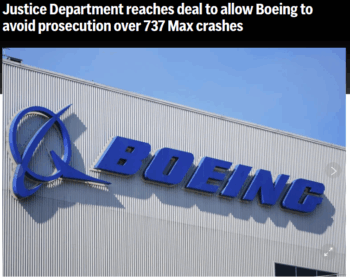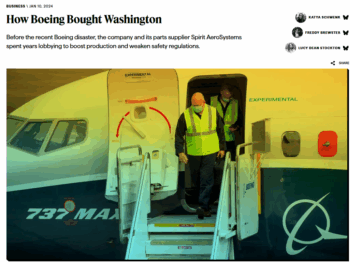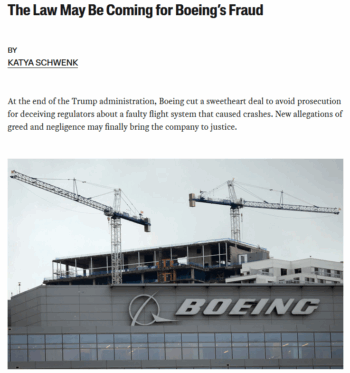Janine Jackson interviewed independent journalist Katya Schwenk about Boeing’s non-prosecution deal for the June 6, 2025, episode of CounterSpin. This is a lightly edited transcript.

AP (5/23/25)
Janine Jackson: There’s no need for me to rewrite the AP story on how Boeing and the Justice Department got together and decided no crime was committed when Boeing’s 737 Max planes crashed in 2018 and 2019, killing 346 people. So I’ll just cite it:
Boeing did not tell airlines and pilots about a new software system, called MCAS, that could turn the plane’s nose down without input from pilots if a sensor detected that the plane might go into an aerodynamic stall.
The Max planes crashed after a faulty reading from the sensor pushed the nose down and pilots were unable to regain control. After the second crash, Max jets were grounded worldwide until the company redesigned MCAS to make it less powerful and to use signals from two sensors, not just one.
The Justice Department charged Boeing in 2021 with deceiving FAA regulators about the software, which did not exist in older 737s, and about how much training pilots would need to fly the plane safely. The department agreed not to prosecute Boeing at the time, however, if the company paid a $2.5 billion settlement, including the $243.6 million fine, and took steps to comply with anti-fraud laws for three years.
Federal prosecutors, however, last year said Boeing violated the terms of the 2021 agreement by failing to make promised changes to detect and prevent violations of federal anti-fraud laws. Boeing agreed last July to plead guilty to the felony fraud charge instead of enduring a potentially lengthy public trial.
But now that we’re up to speed, here’s a reporter whose work, unlike that of AP, is not headlined with a little ticker telling you how Boeing stock is doing. Katya Schwenk is a journalist whose work appears at the Lever, the Intercept and the Baffler, among other outlets. Welcome to CounterSpin, Katya Schwenk.

Lever (1/10/24)
Katya Schwenk: Yeah, thanks so much for having me.
JJ: I used that long quote for information, but I do hope that listeners know that those Indonesia and Ethiopia 737 crashes weren’t the start of all of this. And I know that listeners will have clocked the bit about Boeing agreeing to plead guilty if it would spare them a “lengthy public trial.” So if I kill a few hundred people, I don’t think I can say, “Well, yeah, I did it, and I knew I was doing it, but here’s some change from my bottomless bucket of money, because otherwise I might have to lose my whole summer in court.”
I can’t help but be startled at the reception to this agreement, as though it actually, as a DoJ spokesperson said, “provides finality and compensation for the families and makes an impact for the safety of future air travelers.” Is there any indication of that happening?
KS: Yeah, I think the answer to that is a pretty resounding “no.” I mean, the families do not support this agreement. They had wanted to see Boeing face a trial, face some kind of criminal penalty, face real accountability after the crashes. The families of these people who died in the planes, they had been fighting for years and years to get some small measure of accountability in court.

Jacobin (5/18/24)
And it looked like they might actually see that, when the Justice Department had given Boeing a sweetheart deal under the first Trump administration. It was walked back last year; it seemed like Boeing might actually plead guilty. And then this has basically completely undone all of that.
The fine, in terms of, if you think about how much money Boeing has, it’s somewhat negligible. It includes credit for what they’ve already paid in this case. So I think it’s pretty disappointing for everyone who wanted to see Boeing face real public accountability.
JJ: What is a “non-prosecution agreement,” which is coming up a lot in this? What does it do? What does it not do?
KS: Basically, the Justice Department has agreed to drop all criminal charges against Boeing, and has said that so long as Boeing pays this fine, invests more in its “compliance programs,” it will not be moving forward with any criminal charges. It’s dropping the case, basically.
And this is different from what had been the previous sweetheart deal; it’s even better than the first sweetheart deal, which was a deferred prosecution agreement, which basically meant, we’ll wait and see if we’re going to prosecute you. We’ll see if you comply–if you invest more in your anti-fraud programs, in this case. And the deal that was just released today, this is like, they’re not even going to continue monitoring Boeing. It’s just like, total blank slate, charges are gone.
JJ: The idea that if you just throw enough money at it, it’s not a crime, I just know how weird that lands with everybody who is understanding that that just means if you’re rich, you can do what you want. Or if you’re a corporation and you have enough money, you can commit a crime, and we won’t call it a crime because you can pay. It just sounds wrong.
KS: Yeah. This is like the Trump administration approach to white-collar crime and holding corporations accountable, which is part of a longer-term trend in the US government for decades. But corporations, even when, in this case, many, many people died, right, often are given deals that allow them to just pay a big fine, say they’ve implemented reforms, and get away scot free.
And there was a moment where it felt like Boeing might not. There was so much public scrutiny, there was so much pressure on the DoJ to actually hold them accountable, and instead we’re seeing that.
JJ: I just talked with Jeff Hauser, from the aptly named Revolving Door Project, and it seems like cronyism, and “it’s a big club and you ain’t in it,” has been a part of your focus as you’ve reported this story out for some time now.

Katya Schwenk: “You can really see how close the relationship is between Boeing and people at the highest positions of power in our country.”
KS: Yeah, absolutely. Boeing spends quite a lot of money lobbying Washington. There are people that go into roles at the DoJ or the FAA that have previously worked for Boeing. It’s very much the revolving door at work, and they do quite a lot of business with the federal government.
And so we’ve seen, under the Trump administration, they have granted various giveaways to Boeing. They facilitated a massive deal; the government of Qatar gave Boeing a huge contract to work on fighter jets. You can really see how close the relationship is between Boeing and people at the highest positions of power in our country.
And I think that, definitely, that’s explaining a lot of what’s going on. And I think the more people that we can have paying attention, not only to Boeing, but again to these sort of mechanisms, levers of power, challenging either–I mean, you mentioned the stock price of Boeing is often the focus of a lot of media attention. I think there are many people who would say it’s not good that you have a company responsible for all this air travel that’s totally ruled by Wall Street. And so I think that really needs to be the focus of reporting moving forward, how it’s going, buying influence, who are they answering to? Is it their engineers, is it the flying public? Is it travelers, or is it their shareholders?
JJ: And just finally, if folks do pick up a paper today and look for a story on Boeing, they will likely see a story about how China is scrambling to make something as good as a Boeing plane. That seems to be the way Boeing is showing up in the media right now.
It’s almost as if the story, it’s done. That was yesterday, and now we’re moving on to this corporation that has these deep contracts, military contracts, government contracts. If an individual killed hundreds of people, the story wouldn’t just die because we thought, “Oh, they’re going to go on and do something good, maybe.” It’s a malfeasance on journalism’s part, I feel.
KS: Absolutely. It sends a message, right? It sends a message that you can do something like that, and we’ll move on and we won’t pay attention. So, yeah, I totally agree.
JJ: We’ve been speaking with journalist Katya Schwenk. Her work on Boeing can be found at the Lever and at Jacobin, and no doubt elsewhere. Thank you, Katya Schwenk, very much for joining us this week on CounterSpin.
KS: I appreciate it. Thanks.
This content originally appeared on FAIR and was authored by Janine Jackson.